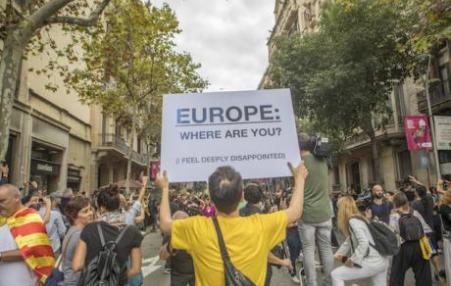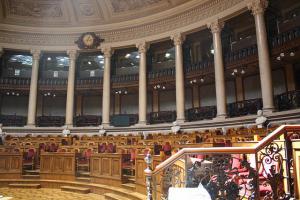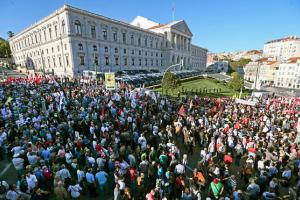Global Left Midweek - November 21, 2018
Portside
 Only a handful of European states are currently governed by left-wing governments, and several of the traditionally largest left-wing parties, such as the Socialist Party in France, have experienced substantial drops in support. Jan Rovny argues that while many commentators have linked the left’s decline to the late-2000s financial crisis, the weakening of Europe’s left reflects deep structural and technological changes that have reshaped European society, leaving left-wing parties out in the cold.
Only a handful of European states are currently governed by left-wing governments, and several of the traditionally largest left-wing parties, such as the Socialist Party in France, have experienced substantial drops in support. Jan Rovny argues that while many commentators have linked the left’s decline to the late-2000s financial crisis, the weakening of Europe’s left reflects deep structural and technological changes that have reshaped European society, leaving left-wing parties out in the cold.
 While France teeters on the brink of the far right, left parties elsewhere are showing surprising strength. Predicting election outcomes is tricky these days, the Brexit and the election of Donald Trump being cases in point. The most volatile of the upcoming ballots are in France and Italy. Germany's will certainly be important, but even if Merkel survives, the center-right will be much diminished and the left stronger. And that will have EU-wide implications.
While France teeters on the brink of the far right, left parties elsewhere are showing surprising strength. Predicting election outcomes is tricky these days, the Brexit and the election of Donald Trump being cases in point. The most volatile of the upcoming ballots are in France and Italy. Germany's will certainly be important, but even if Merkel survives, the center-right will be much diminished and the left stronger. And that will have EU-wide implications.
 Even though the right-wing Forward Portugal lost the election—it garnered only 38 percent of the votes—Silva allowed its leader, former Prime Minister Passos Coelho, to form a government. That maneuver lasted just 11 days. Coelho introduced a budget loaded with austerity measures and privatization. In the face of growing outrage and a threatened general strike Silva finally asked Socialist Party leader Antonio Costa to form a government.
Even though the right-wing Forward Portugal lost the election—it garnered only 38 percent of the votes—Silva allowed its leader, former Prime Minister Passos Coelho, to form a government. That maneuver lasted just 11 days. Coelho introduced a budget loaded with austerity measures and privatization. In the face of growing outrage and a threatened general strike Silva finally asked Socialist Party leader Antonio Costa to form a government.
 The Socialist leader, António Costa, 54, is now expected to become prime minister in the coming weeks with a broad, leftwing coalition government, which hopes to ease austerity while still adhering to European Union rules. “The taboo has ended; the wall has been broken,” he said after the vote. “This is a new political framework; the old majority cannot pretend to be what it stopped being.”
The Socialist leader, António Costa, 54, is now expected to become prime minister in the coming weeks with a broad, leftwing coalition government, which hopes to ease austerity while still adhering to European Union rules. “The taboo has ended; the wall has been broken,” he said after the vote. “This is a new political framework; the old majority cannot pretend to be what it stopped being.”
 In upcoming votes for the European Union's most indebted countries, the left will have to battle both the forces of austerity and a resurgent xenophobic right. The backdrop for elections in Greece, Portugal, Spain, and Ireland is one of deep economic crisis originally ignited by the American financial collapse of 2007-08. The response of the EU is massive cutbacks in government spending, widespread layoffs, and double-digit tax hikes on consumers.
In upcoming votes for the European Union's most indebted countries, the left will have to battle both the forces of austerity and a resurgent xenophobic right. The backdrop for elections in Greece, Portugal, Spain, and Ireland is one of deep economic crisis originally ignited by the American financial collapse of 2007-08. The response of the EU is massive cutbacks in government spending, widespread layoffs, and double-digit tax hikes on consumers.
Spread the word